中国英语能力等级量表对应的年级
- 格式:docx
- 大小:3.36 KB
- 文档页数:3
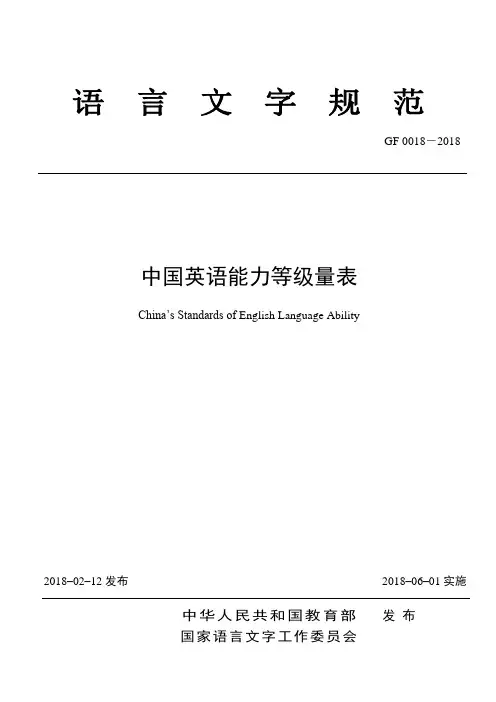
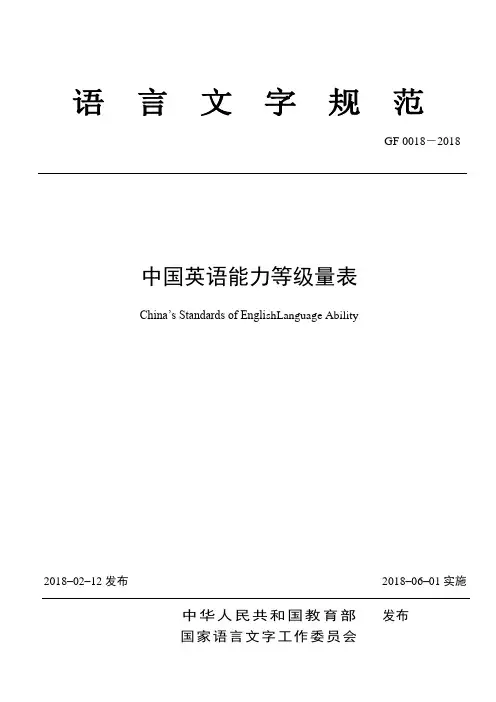
China’s Standards of EnglishLanguage Ability中国英语能力等级量表China’s Standards of Engli shLanguage Ability2018–02–12发布 2018–06–01实施GF 0018-2018目次前言 (III)1 范围 (1)2 术语和定义 (1)3 能力等级 (2)4 能力描述框架 (2)5 能力总表 (5)6 分项能力表 (15)7 自我评价量表 (100)GF 0018-2018前言本规范由教育部考试中心、教育部语言文字信息管理司提出。
本规范由国家语言文字工作委员会语言文字规范标准审定委员会审定。
本规范起草单位:教育部考试中心。
本规范起草人:刘建达、何莲珍、金艳、曾用强、邹申、武尊民、韩宝成、穆雷、严明、冯莉、朱正才、张文霞、姜钢、于涵、吴莎、韩家勋、程蒙蒙等。
IIIGF 0018-2018中国英语能力等级量表1 范围本规范规定了中国英语学习者和使用者的英语能力等级,描述了各等级的能力表现特征。
本规范适用于英语测评,可供英语教学、学习及其他参考。
2 术语和定义下列术语和定义适用于本规范。
2.1量表scale对能力进行评估和分级的系列标准。
2.2语言能力language ability语言学习者和使用者运用自己的语言知识、非语言知识以及各种策略,参与特定情境下某一话题的语言活动时表现出来的语言理解能力和语言表达能力。
2.3语言知识linguistic knowledge在各种语言活动中有效使用语言需具备的知识,包括组构知识(语法知识和篇章知识)和语用知识(功能知识和社会语言知识)。
2.4语言使用策略language use strategy完成某项语言行为所采取的有组织、有计划、目标明确的行动步骤和方法。
2.5话题topic语言活动的主题。
2.6语言活动language activity在特定情境中有目的的语言交际行为。
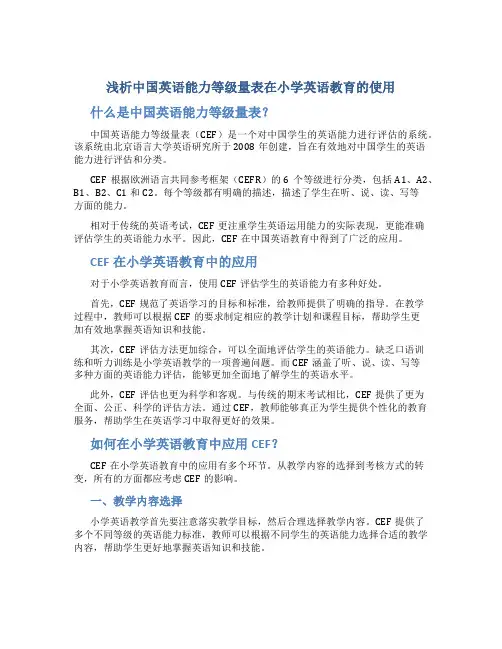
浅析中国英语能力等级量表在小学英语教育的使用什么是中国英语能力等级量表?中国英语能力等级量表(CEF)是一个对中国学生的英语能力进行评估的系统。
该系统由北京语言大学英语研究所于2008年创建,旨在有效地对中国学生的英语能力进行评估和分类。
CEF根据欧洲语言共同参考框架(CEFR)的6个等级进行分类,包括A1、A2、B1、B2、C1和C2。
每个等级都有明确的描述,描述了学生在听、说、读、写等方面的能力。
相对于传统的英语考试,CEF更注重学生英语运用能力的实际表现,更能准确评估学生的英语能力水平。
因此,CEF在中国英语教育中得到了广泛的应用。
CEF在小学英语教育中的应用对于小学英语教育而言,使用CEF评估学生的英语能力有多种好处。
首先,CEF规范了英语学习的目标和标准,给教师提供了明确的指导。
在教学过程中,教师可以根据CEF的要求制定相应的教学计划和课程目标,帮助学生更加有效地掌握英语知识和技能。
其次,CEF评估方法更加综合,可以全面地评估学生的英语能力。
缺乏口语训练和听力训练是小学英语教学的一项普遍问题。
而CEF涵盖了听、说、读、写等多种方面的英语能力评估,能够更加全面地了解学生的英语水平。
此外,CEF评估也更为科学和客观。
与传统的期末考试相比,CEF提供了更为全面、公正、科学的评估方法。
通过CEF,教师能够真正为学生提供个性化的教育服务,帮助学生在英语学习中取得更好的效果。
如何在小学英语教育中应用CEF?CEF在小学英语教育中的应用有多个环节。
从教学内容的选择到考核方式的转变,所有的方面都应考虑CEF的影响。
一、教学内容选择小学英语教学首先要注意落实教学目标,然后合理选择教学内容。
CEF提供了多个不同等级的英语能力标准,教师可以根据不同学生的英语能力选择合适的教学内容,帮助学生更好地掌握英语知识和技能。
二、教学方法运用CEF要求学生在听、说、读、写等多个方面达到不同的水平,因此教师在英语教学过程中更要注意合理运用不同的教学方法。
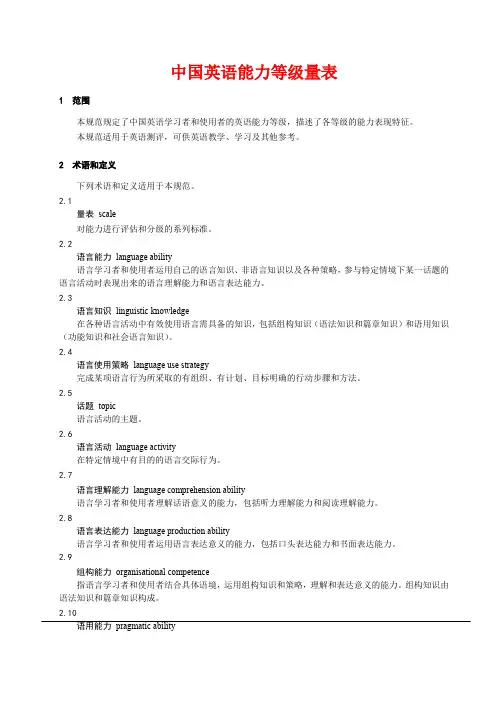
中国英语能力等级量表1 范围本规范规定了中国英语学习者和使用者的英语能力等级,描述了各等级的能力表现特征。
本规范适用于英语测评,可供英语教学、学习及其他参考。
2 术语和定义下列术语和定义适用于本规范。
2.1量表scale对能力进行评估和分级的系列标准。
2.2语言能力language ability语言学习者和使用者运用自己的语言知识、非语言知识以及各种策略,参与特定情境下某一话题的语言活动时表现出来的语言理解能力和语言表达能力。
2.3语言知识linguistic knowledge在各种语言活动中有效使用语言需具备的知识,包括组构知识(语法知识和篇章知识)和语用知识(功能知识和社会语言知识)。
2.4语言使用策略language use strategy完成某项语言行为所采取的有组织、有计划、目标明确的行动步骤和方法。
2.5话题topic语言活动的主题。
2.6语言活动language activity在特定情境中有目的的语言交际行为。
2.7语言理解能力language comprehension ability语言学习者和使用者理解话语意义的能力,包括听力理解能力和阅读理解能力。
2.8语言表达能力language production ability语言学习者和使用者运用语言表达意义的能力,包括口头表达能力和书面表达能力。
2.9组构能力organisational competence指语言学习者和使用者结合具体语境,运用组构知识和策略,理解和表达意义的能力。
组构知识由语法知识和篇章知识构成。
2.10语用能力pragmatic ability语言学习者和使用者结合具体语境,运用各种知识和策略,理解和表达特定交际意图的能力,包括语用理解能力和语用表达能力。
2.11文本text口头或书面语言的表现形式,可以是语句、段落或者篇章。
3 能力等级中国英语学习者和使用者的英语语言能力从低到高分为一至九个等级,归为基础、提高、熟练三个阶段。
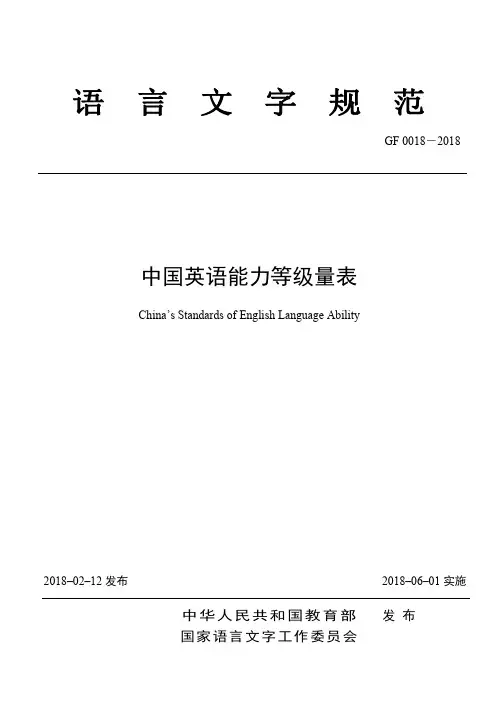
发布语言文字规范GF 0018-2018中国英语能力等级量表China’s Standards of English Language Ability2018–02–12发布2018–06–01实施中华人民共和国教育部国家语言文字工作委员会GF0018-2018目次前言 (III)1范围 (1)2术语和定义 (1)3能力等级 (2)4能力描述框架 (2)5能力总表 (5)6分项能力表 (15)7自我评价量表 (99)GF0018-2018前言本规范由教育部考试中心、教育部语言文字信息管理司提出。
本规范由国家语言文字工作委员会语言文字规范标准审定委员会审定。
本规范起草单位:教育部考试中心。
本规范起草人:刘建达、何莲珍、金艳、曾用强、邹申、武尊民、韩宝成、穆雷、严明、冯莉、朱正才、张文霞、姜钢、于涵、吴莎、韩家勋、程蒙蒙等。
IIIGF0018-2018中国英语能力等级量表1范围本规范规定了中国英语学习者和使用者的英语能力等级,描述了各等级的能力表现特征。
本规范适用于英语测评,可供英语教学、学习及其他参考。
2术语和定义下列术语和定义适用于本规范。
2.1量表scale对能力进行评估和分级的系列标准。
2.2语言能力language ability语言学习者和使用者运用自己的语言知识、非语言知识以及各种策略,参与特定情境下某一话题的语言活动时表现出来的语言理解能力和语言表达能力。
2.3语言知识linguistic knowledge在各种语言活动中有效使用语言需具备的知识,包括组构知识(语法知识和篇章知识)和语用知识(功能知识和社会语言知识)。
2.4语言使用策略language use strategy完成某项语言行为所采取的有组织、有计划、目标明确的行动步骤和方法。
2.5话题topic语言活动的主题。
2.6语言活动language activity在特定情境中有目的的语言交际行为。
2.7语言理解能力language comprehension ability语言学习者和使用者理解话语意义的能力,包括听力理解能力和阅读理解能力。

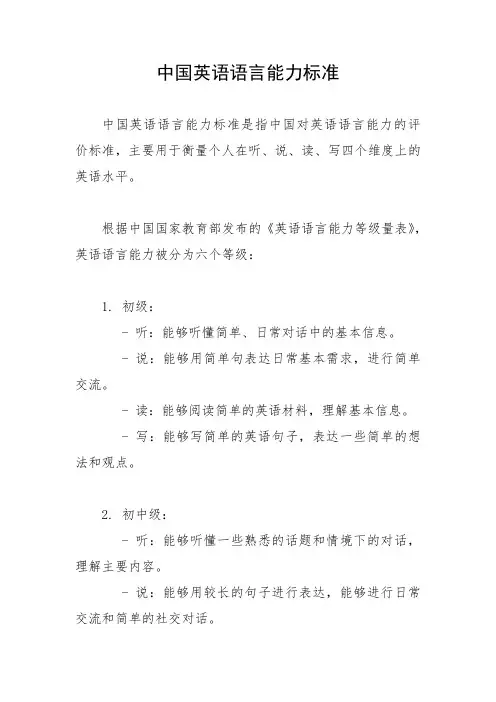
中国英语语言能力标准中国英语语言能力标准是指中国对英语语言能力的评价标准,主要用于衡量个人在听、说、读、写四个维度上的英语水平。
根据中国国家教育部发布的《英语语言能力等级量表》,英语语言能力被分为六个等级:1. 初级:- 听:能够听懂简单、日常对话中的基本信息。
- 说:能够用简单句表达日常基本需求,进行简单交流。
- 读:能够阅读简单的英语材料,理解基本信息。
- 写:能够写简单的英语句子,表达一些简单的想法和观点。
2. 初中级:- 听:能够听懂一些熟悉的话题和情境下的对话,理解主要内容。
- 说:能够用较长的句子进行表达,能够进行日常交流和简单的社交对话。
- 读:能够阅读一些短文和材料,理解大意和主要信息。
- 写:能够用较长的句子写作,表达个人观点和简单的事实描述。
3. 中级:- 听:能够听懂较长的对话和演讲,理解对话内容和主题。
- 说:能够用流利的口语表达自己的观点和意见,进行复杂的交流。
- 读:能够阅读较长的文章和材料,理解详细信息和推理出一些信息。
- 写:能够写较长的文章,表达个人观点和进行简单的分析和解释。
4. 中高级:- 听:能够听懂复杂的讲座和演讲,理解抽象概念和复杂信息。
- 说:能够用流利、准确的口语表达和交流,进行辩论和演讲。
- 读:能够阅读复杂的文章和专业材料,理解深层次的信息和推理。
- 写:能够写较长、较复杂的文章,进行深入分析和论证。
5. 高级:- 听:能够听懂各种类型的演讲和讲座,理解隐含意义和复杂的话题。
- 说:能够用流利、准确的口语表达和交流,进行复杂的辩论和演讲。
- 读:能够阅读各种类型的文章和专业材料,理解深层次的论证和观点。
- 写:能够写各种类型的文章,进行独立思考和深入探讨。
6. 专家级:- 听:能够听懂非常复杂和专业的演讲和讲座,理解深层次的专业知识。
- 说:能够用流利、准确的口语表达和交流,进行专业领域的辩论和演讲。
- 读:能够阅读非常复杂和专业的文章和材料,理解专业领域的深度信息。
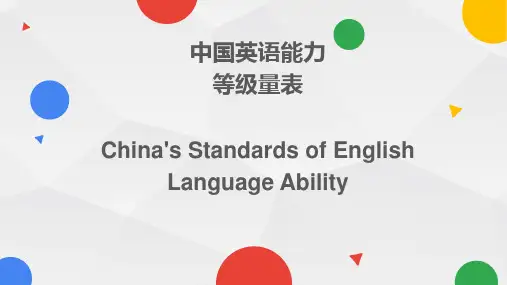

中国英语能力等级量表与大学英语听力教学中国英语能力等级量表是为评价学习者的英语能力水平而设计的,它对学习者的听、说、读、写四个方面进行了详细的划分和描述。
听力能力是其中的一个重要组成部分。
中国英语能力等级量表共分为6个级别,分别是A1、A2、B1、B2、C1、C2。
A1和A2级别的学生主要能够听懂简单的日常用语和常见的单词;B1级别的学生已经能够听懂简单的对话和文章,并能够理解其中的大意;B2级别的学生能够听懂各类对话和文章,并能够进行相对复杂的语篇分析;C1和C2级别的学生则已经具备了高级水平的听力能力,能够听懂各类复杂的对话和文章,并能够进行深入的语篇分析。
在大学英语听力教学中,教师们可以根据中国英语能力等级量表来制定教学目标和教学内容,有针对性地进行听力教学。
针对A1级别的学生,教师可以选择一些简单的英语材料,如日常用语、简单的对话和故事等,帮助学生逐步培养起听懂英语的能力;而对于B2级别的学生,则可以使用一些相对复杂的英语材料,如新闻报道、学术论文等,帮助学生提高英语语言水平和分析能力。
通过根据学生的英语能力等级来设计教学内容,可以更好地满足学生的学习需求,提高教学效果。
除了根据中国英语能力等级量表来制定教学内容外,教师还可以通过模拟英语能力等级考试的形式来进行听力测试,帮助学生了解自己的英语水平并及时调整学习计划。
通过这种方式,学生可以更直观地了解自己在英语听力能力方面的优势和不足,并在此基础上有针对性地进行听力训练和提高。
教师也可以根据学生的听力表现来调整教学方法和节奏,使得听力教学更加有效。
在大学英语听力教学中,还可以通过多种形式来进行教学,如听力训练、听力策略训练、听力材料分析等。
听力训练是指通过大量的听力练习,帮助学生熟悉并掌握英语听力技巧和规律,提高听力速度和准确度。
教师可以通过讲解和示范,引导学生掌握一些实用的听力策略,如预测、推断、注意关键词等,帮助学生更好地理解听力材料。

China’s Standards of EnglishLanguage Ability中国英语能力等级量表China’s Standards of Engli shLanguage Ability2018–02–12发布 2018–06–01实施GF 0018-2018目次前言 (III)1 范围 (1)2 术语和定义 (1)3 能力等级 (2)4 能力描述框架 (2)5 能力总表 (5)6 分项能力表 (15)7 自我评价量表 (100)GF 0018-2018前言本规范由教育部考试中心、教育部语言文字信息管理司提出。
本规范由国家语言文字工作委员会语言文字规范标准审定委员会审定。
本规范起草单位:教育部考试中心。
本规范起草人:刘建达、何莲珍、金艳、曾用强、邹申、武尊民、韩宝成、穆雷、严明、冯莉、朱正才、张文霞、姜钢、于涵、吴莎、韩家勋、程蒙蒙等。
IIIGF 0018-2018中国英语能力等级量表1 范围本规范规定了中国英语学习者和使用者的英语能力等级,描述了各等级的能力表现特征。
本规范适用于英语测评,可供英语教学、学习及其他参考。
2 术语和定义下列术语和定义适用于本规范。
2.1量表scale对能力进行评估和分级的系列标准。
2.2语言能力language ability语言学习者和使用者运用自己的语言知识、非语言知识以及各种策略,参与特定情境下某一话题的语言活动时表现出来的语言理解能力和语言表达能力。
2.3语言知识linguistic knowledge在各种语言活动中有效使用语言需具备的知识,包括组构知识(语法知识和篇章知识)和语用知识(功能知识和社会语言知识)。
2.4语言使用策略language use strategy完成某项语言行为所采取的有组织、有计划、目标明确的行动步骤和方法。
2.5话题topic语言活动的主题。
2.6语言活动language activity在特定情境中有目的的语言交际行为。
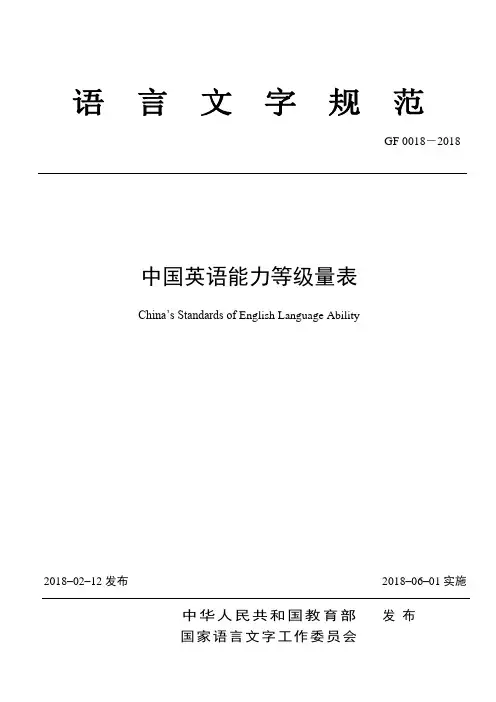
China’s Standards of English Language Ability中国英语能力等级量表China’s Standards of English Language Ability2018–02–12发布 2018–06–01实施GF 0018-2018目次前言 (III)1 范围 (1)2 术语和定义 (1)3 能力等级 (2)4 能力描述框架 (2)5 能力总表 (5)6 分项能力表 (15)7 自我评价量表 (99)GF 0018-2018前言本规范由教育部考试中心、教育部语言文字信息管理司提出。
本规范由国家语言文字工作委员会语言文字规范标准审定委员会审定。
本规范起草单位:教育部考试中心。
本规范起草人:刘建达、何莲珍、金艳、曾用强、邹申、武尊民、韩宝成、穆雷、严明、冯莉、朱正才、张文霞、姜钢、于涵、吴莎、韩家勋、程蒙蒙等。
I IIGF 0018-2018中国英语能力等级量表1 范围本规范规定了中国英语学习者和使用者的英语能力等级,描述了各等级的能力表现特征。
本规范适用于英语测评,可供英语教学、学习及其他参考。
2 术语和定义下列术语和定义适用于本规范。
2.1量表scale对能力进行评估和分级的系列标准。
2.2语言能力language ability语言学习者和使用者运用自己的语言知识、非语言知识以及各种策略,参与特定情境下某一话题的语言活动时表现出来的语言理解能力和语言表达能力。
2.3语言知识linguistic knowledge在各种语言活动中有效使用语言需具备的知识,包括组构知识(语法知识和篇章知识)和语用知识(功能知识和社会语言知识)。
2.4语言使用策略language use strategy完成某项语言行为所采取的有组织、有计划、目标明确的行动步骤和方法。
2.5话题topic语言活动的主题。
2.6语言活动language activity在特定情境中有目的的语言交际行为。
中国英语能力等级量表和四六级对照表全文共6篇示例,供读者参考篇1English is an Important LanguageHi there, friends! Have you ever wondered why learning English is so important? Well, let me tell you all about it!English is spoken in many countries around the world, and it's the language used for international communication. Whether you're traveling abroad, watching movies from other countries, or even playing video games online with friends from different parts of the world, knowing English can help you understand and communicate better.In China, we have a special way to measure how good our English skills are. It's called the Chinese English Proficiency Scale, or CEPS for short. This scale has nine levels, ranging from level 1 (the easiest) to level 9 (the most difficult).The CEPS Levels ExplainedLevel 1 and Level 2 are for beginners who are just starting to learn English. At these levels, you can understand and use verysimple words and phrases, like "hello," "thank you," and "my name is..."Level 3 and Level 4 are for those who have a basic understanding of English. You can read and write simple texts, engage in basic conversations, and understand the main ideas of short stories or articles.Level 5 and Level 6 are for intermediate learners. At these levels, you can communicate more fluently in English, understand longer texts and conversations, and express your opinions and ideas more clearly.Level 7 and Level 8 are for advanced learners. If you're at these levels, you can understand complex texts and speeches, participate in discussions on various topics, and express yourself accurately and eloquently.Level 9 is the highest level, which means you have anative-like proficiency in English. At this level, you can understand and use English just like someone who grew up speaking the language.The CET-4 and CET-6 ExamsIn China, we have two important English exams called CET-4 and CET-6. These exams are used to test your English proficiency and see which CEPS level you're at.The CET-4 (College English Test Band 4) is taken by college students. If you pass this exam, it means your English proficiency is around level 5 or 6 on the CEPS scale.The CET-6 (College English Test Band 6) is a more advanced exam, usually taken by students who want to pursue higher studies or work in fields that require excellent English skills. If you pass the CET-6, it means your English proficiency is around level 7 or 8 on the CEPS scale.Why Learn English?Now that you know about the CEPS levels and the CET exams, you might be wondering why it's so important to learn English well.First of all, having good English skills can open up many opportunities for you. You can study or work in other countries, communicate with people from different cultures, and even get better jobs that require English proficiency.Secondly, learning English can help you understand and appreciate different cultures and ways of thinking. When youlearn a new language, you're not just learning words and grammar; you're also learning about the people who speak that language, their customs, and their perspectives.Finally, learning English can be fun and rewarding! You can read books, watch movies, and listen to music in English, which can be a great way to explore new ideas and experiences.So, my friends, don't be afraid to dive into the world of English! Start practicing, take the CET exams when you're ready, and aim for those higher CEPS levels. Who knows, maybe one day you'll reach level 9 and be as fluent as a native English speaker!篇2Certainly! Here's an article about the Chinese Proficiency Test and its correlation with the CET-4 and CET-6 exams, written in English with a tone suitable for elementary school students. The length of the article is approximately 2,000 words.The Awesome World of English Levels in ChinaHey there, kids! Are you ready to explore the exciting realm of English proficiency levels in China? It's like a giant game whereyou can climb up different levels and become a true English champ! Let's dive right in!In China, we have this cool thing called the Chinese Proficiency Test (CPT). It's like a big ruler that measures how good you are at English. The higher your level on the CPT, the better you understand and speak the language. Isn't that neat?Now, the CPT has nine different levels, just like the floors in a tall building. The lowest level is Level 1, which is perfect for beginners who are just starting to learn English. As you keep practicing and improving, you can move up to higher levels, all the way up to Level 9, which is for super-advanced English speakers!But wait, there's more! You see, in China, we also have two other important English exams called CET-4 and CET-6. They're like special checkpoints on your English journey.The CET-4 is like a big gate that you need to pass through to show that you've reached a certain level of English proficiency. If you pass the CET-4, it means you're at Level 5 or Level 6 on the CPT. Woohoo! You're making great progress!And then there's the CET-6, which is like a super-duper gate that only the most advanced English learners can go through. Ifyou conquer the CET-6, it means you're at Level 8 or Level 9 on the CPT. Wow, you're like an English superhero!But don't worry if you're still at a lower level on the CPT. Everyone starts somewhere, and as long as you keep practicing and having fun with English, you'll keep climbing up those levels one by one.Now, let me tell you a little secret. The CPT levels and the CET exams are like a map that can guide you on your English adventure. The higher your level on the CPT, the more doors will open for you. You'll be able to read more books, watch more movies, and make friends from all around the world!Imagine being able to travel to different countries and chat with people in English like a pro. Or maybe you'll become a famous writer or a translator, helping people understand each other better. The possibilities are endless!So, what are you waiting for? Grab your backpack, pack your pencils, and let's embark on this incredible journey together! With hard work and determination, you can conquer the CPT levels and ace those CET exams. Remember, every step you take brings you closer to becoming an English master!篇3Title: Understanding English Levels in China: The Fun Way!Hi there, kids! Do you like learning English? I know, I know, it can be a bit tricky sometimes, but guess what? Today, we're going to talk about something super cool – the different English levels in China! Imagine a big, colorful staircase, where each step represents a new level of English proficiency. Exciting, right? Let's climb those stairs together and discover the fun world of English proficiency levels!First things first, let's talk about the China's English Proficiency Level Scale, or CEPLS for short. It's like a ruler that measures how good you are at English. Pretty neat, huh? The CEPLS has nine levels, ranging from Level 1 (beginner) to Level 9 (super duper advanced). Each level has its own set of skills and knowledge that you need to master before moving up to the next one. It's like leveling up in your favorite video game!Now, let's talk about CET-4 and CET-6. These are two really important English exams in China. CET-4 stands for College English Test Band 4, and CET-6 stands for College English Test Band 6. They're like big challenges that test your English skills. If you pass CET-4, it means you've reached a certain level of English proficiency. And if you pass CET-6, well, you're like an English superhero!But how do these exams relate to the CEPLS, you ask? Well, let me tell you! CET-4 corresponds to Level 4 on the CEPLS, while CET-6 corresponds to Level 6. That means if you pass CET-4, you're at Level 4 on the CEPLS, and if you pass CET-6, you've reached Level 6! Pretty cool, right?Now, let's explore each level a bit more:Level 1 (Beginner): This is where you start your English adventure! At this level, you'll learn the basics, like the alphabet, simple words, and basic phrases. It's like learning to walk before you can run.Level 2 (Elementary): Here, you'll start building your English vocabulary and understanding simple conversations. You'll be able to introduce yourself and talk about your family and hobbies. It's like taking your first steps on the English journey!Level 3 (Pre-Intermediate): At this level, you'll start to understand more complex sentences and have basic conversations about everyday topics. You'll also start reading and writing short texts. It's like gaining momentum on your English adventure!Level 4 (Intermediate): This is where you'll reach the CET-4 level! You'll be able to communicate in English fluently,understand longer texts, and write clear and organized paragraphs. It's like reaching the first big milestone on your English journey!Level 5 (Upper-Intermediate): Here, you'll start to really stretch your English muscles. You'll be able to understand more advanced topics, read and write longer texts, and have in-depth conversations. It's like leveling up in your English game!Level 6 (Advanced): Congratulations, you've reached the CET-6 level! At this stage, you'll be able to communicate effortlessly in English, understand complex ideas, and write clearly and persuasively. You're practically an English superhero!Level 7 (Proficient): This level is for the true English masters! You'll be able to understand and use English at a near-native level, handle any topic with ease, and communicate with confidence in any situation. You're like a linguistic ninja!Level 8 (Highly Proficient): At this level, you're basically an English prodigy! You'll have an incredibly deep understanding of the language, including its nuances, idioms, and cultural references. You're like an English wizard!Level 9 (Expert): This is the ultimate level of English proficiency. You'll have mastered the language to the pointwhere you can use it as effectively as a native speaker. You're like an English god! (But in a good way, of course.)Phew, that was quite a journey, wasn't it? Now you know all about the CEPLS and how it relates to CET-4 and CET-6. Remember, learning English is like climbing a big, exciting staircase – it takes time, effort, and lots of practice, but it's an adventure worth taking!So, keep climbing those stairs, my friends! With each level you reach, you'll unlock new doors and discover new worlds. Who knows, maybe one day you'll reach Level 9 and become an English expert! Just believe in yourself, have fun, and never stop learning. The English adventure awaits!篇4The Big English Tests in ChinaHi there! My name is Lily and I'm 10 years old. Today, I want to talk to you about the big English tests that students in China have to take. It's called the CET, which stands for College English Test. There are two main levels - CET-4 and CET-6. But before we get into those, let me tell you about the Chinese English Proficiency Level Scale.The What Scale?The Chinese English Proficiency Level Scale is a way to measure how good someone is at English. It has nine levels, from Level 1 (the easiest) to Level 9 (the hardest). The lower levels are for beginners, and the higher levels are for people who are really, really good at English.Here's a quick look at the nine levels:Level 1: You can understand and use very simple English for basic communication.Level 2: You can handle short, simple conversations about familiar topics.Level 3: You can communicate in English for daily life and work.Level 4: You can communicate fluently on general topics.Level 5: You can communicate effectively in most situations.Level 6: You have a good command of English for study and work.Level 7: You can communicate skilfully in demanding situations.Level 8: You have a very high level of English proficiency.Level 9: You have full mastery of English at the highest level.Wow, that's a lot of levels! But don't worry, we'll focus on the ones that are most important for students in China.The CET-4 and CET-6Now, let's talk about the CET-4 and CET-6. These are two big English tests that college students in China have to take.The CET-4 is the first one, and it's a bit easier than the CET-6. If you pass the CET-4, it means you're at a pretty good level of English. You can understand and use English for daily communication and study.The CET-6 is the harder one. If you pass this test, it means you're really good at English. You can communicate fluently and handle more complex topics and situations.So, how do these tests match up with the Chinese English Proficiency Level Scale? Let's take a look!CET-4 = Level 4 or 5 on the ScaleIf you pass the CET-4, you're probably at Level 4 or 5 on the Chinese English Proficiency Level Scale. That means you cancommunicate fluently on general topics and handle most situations pretty well.CET-6 = Level 6 or 7 on the ScaleIf you pass the CET-6, you're likely at Level 6 or 7 on the Scale. That means you have a really good command of English for study and work, and you can communicate skilfully in demanding situations.Why Are These Tests Important?You might be wondering, "Why do I need to take these tests? They sound hard!" Well, they are pretty tough, but they're also really important for students in China.Passing the CET-4 and CET-6 can help you get better jobs and opportunities. Many companies and schools in China want to hire people who have good English skills. If you can show that you passed these tests, it proves that you're good at English.Plus, if you want to study abroad or go to graduate school, having a good score on the CET-4 or CET-6 can really help your application.So, even though these tests might seem difficult, they're worth working hard for. The better your English skills, the more doors will open for you in the future.My English JourneyI know I'm still just a kid, but I'm already working on improving my English. I want to be able to pass the CET-4 and CET-6 when I get to college. That way, I can aim for Level 6 or 7 on the Chinese English Proficiency Level Scale.It's not always easy, but I try to practice my English every day.I read books, watch movies, and even talk to myself in English sometimes! My parents also hired an English tutor to help me with my grammar and conversation skills.I still have a long way to go, but I'm excited to keep learning. Who knows, maybe one day I'll even reach Level 9 on the Scale and become a true English master!Well, that's all I have to say about the big English tests in China. I hope this helped you understand the Chinese English Proficiency Level Scale and how it relates to the CET-4 and CET-6. Remember, the more you practice, the better you'll get. Good luck on your English journey!篇5Here's an article about the Correspondence between China's English Proficiency Scale and CET-4/6, written in a child-friendly tone with around 2,000 words:Learning English in China: Levels and Tests ExplainedHey there, kids! Are you ready to learn about something super important in the world of English education in China? Today, we're going to talk about the different levels of English proficiency and the tests you might need to take as you progress through your studies. Exciting, right? Let's dive in!First, let's talk about the China's English Proficiency Scale. This scale has nine levels, ranging from Level 1 (the most basic) to Level 9 (the most advanced). Each level represents a specific set of skills and knowledge that you need to demonstrate to move up the ladder.Level 1 is for those who are just starting to learn English. If you're at this level, you can probably introduce yourself, say a few simple phrases, and recognize some basic words and numbers.Level 2 is a bit more challenging. At this level, you can understand and use familiar everyday expressions and basicphrases. You can also introduce yourself and others and ask and answer simple questions about personal details.Level 3 is where things start to get more interesting. You can now understand and use simple sentences related to familiar topics like family, hobbies, and work. You can also describe your surroundings in simple terms.As you progress through Levels 4, 5, and 6, your English skills become even more impressive. You can understand and use more complex sentences, participate in conversations on familiar topics, and even describe events and experiences in some detail.Levels 7, 8, and 9 are for the true English superstars! At these levels, you can understand and use English fluently in almost any situation. You can express yourself clearly and precisely, participate in discussions on complex topics, and even use idiomatic expressions and colloquial language like a pro.Now, let's talk about the tests you might need to take to prove your English skills. The two most well-known tests in China are the CET-4 (College English Test Band 4) and the CET-6 (College English Test Band 6).The CET-4 is a national English proficiency test that college students in China usually take after their second year of study. Ittests your English skills at around Levels 4 or 5 on the China's English Proficiency Scale. Passing the CET-4 is often a requirement for getting your bachelor's degree.The CET-6, on the other hand, is a more advanced test that you can take after passing the CET-4. It tests your English skills at around Levels 6 or 7 on the scale. The CET-6 is often required for admission to graduate programs or for certain job opportunities that require a higher level of English proficiency.So, how do these levels and tests correspond? Well, let's break it down:Levels 1-3: These are the basic levels, where you're just starting to learn English. You don't need to worry about the CET tests yet.Level 4: This is roughly equivalent to the level tested on the CET-4. If you can pass the CET-4, you're likely at Level 4 or higher.Level 5: This is also tested on the CET-4. If you score well on the CET-4, you might be at Level 5.Level 6: This level corresponds to the CET-6. Passing the CET-6 means you're likely at Level 6 or higher.Levels 7-9: These are the advanced levels, beyond the CET-6. If you're at these levels, you're practically fluent in English!Remember, these levels and tests are just guidelines to help you track your progress and set goals. The most important thing is to keep practicing, learning, and having fun with the English language!So, there you have it, kids! Now you know all about the China's English Proficiency Scale and how it relates to the CET-4 and CET-6 tests. Keep working hard, and who knows, maybe one day you'll be at Level 9 and speaking English like a true pro!篇6The Great English Adventure!Hi there! My name is Lily and I'm going to tell you all about the exciting world of English levels in China. It's like a big adventure game where you go through different stages and earn cool prizes!In China, we have something called the English Proficiency Level Scale. It's kind of like a video game with different levels you need to complete. The scale has nine levels, starting from level one which is for beginners, all the way up to level nine for super English masters!Now, let me explain each level like a fun story:Level 1 is like being a tiny seed just starting to sprout. You're learning the basics of English like the alphabet and simple words.Level 2 is like growing into a little seedling. You can understand and use some basic English phrases for everyday life.Level 3 is when you become a young plant. You can have simple conversations and read easy English stories.Level 4 is like a strong plant ready to bloom. You can communicate in English quite well and understand most of what you hear and read.Level 5 is a beautiful flower in full bloom! You're becoming really good at English and can express yourself clearly.Level 6 is a tree standing tall and strong. Your English skills are very high and you can understand complex topics.Level 7 is a mighty oak tree. You're an English expert who can communicate fluently in any situation.Level 8 is a wise old tree with deep roots. Your English is professional-level and you can understand even the most difficult materials.Level 9 is like a magical forest guardian. You have complete mastery over the English language and can use it perfectly in any context.Pretty cool, right? But how do you level up in this game? Well, that's where the CET-4 and CET-6 exams come in!CET-4 stands for College English Test Band 4. It's a big test that shows you've reached level 4 on the English Proficiency Scale. If you pass CET-4, it means you've unlocked that level!CET-6 is the College English Test Band 6. It's an even tougher exam that proves you've mastered level 6 English skills. Only the bravest English adventurers take on this challenge!So, to sum it up, the lower levels on the scale from 1 to 3 are like starting your English journey. Levels 4 and 5 show you're getting really good, which is what CET-4 tests. Levels 6 to 9 are for the English experts, and CET-6 checks if you've reached that highest level 6 milestone.But don't worry if you're still at a lower level. This is an adventure game and everyone goes at their own pace. The most important thing is to keep practicing, learning new things, and having fun with English!Who's ready to embark on an amazing English quest? Level up your skills, earn those badges, and become a true language hero! The adventure awaits!。
China’s Standards of EnglishLanguage Ability中国英语能力等级量表China’s Standards of Engli shLanguage Ability2018–02–12发布 2018–06–01实施GF 0018-2018目次前言 (III)1 范围 (1)2 术语和定义 (1)3 能力等级 (2)4 能力描述框架 (2)5 能力总表 (5)6 分项能力表 (15)7 自我评价量表 (100)GF 0018-2018前言本规范由教育部考试中心、教育部语言文字信息管理司提出。
本规范由国家语言文字工作委员会语言文字规范标准审定委员会审定。
本规范起草单位:教育部考试中心。
本规范起草人:刘建达、何莲珍、金艳、曾用强、邹申、武尊民、韩宝成、穆雷、严明、冯莉、朱正才、张文霞、姜钢、于涵、吴莎、韩家勋、程蒙蒙等。
IIIGF 0018-2018中国英语能力等级量表1 范围本规范规定了中国英语学习者和使用者的英语能力等级,描述了各等级的能力表现特征。
本规范适用于英语测评,可供英语教学、学习及其他参考。
2 术语和定义下列术语和定义适用于本规范。
2.1量表scale对能力进行评估和分级的系列标准。
2.2语言能力language ability语言学习者和使用者运用自己的语言知识、非语言知识以及各种策略,参与特定情境下某一话题的语言活动时表现出来的语言理解能力和语言表达能力。
2.3语言知识linguistic knowledge在各种语言活动中有效使用语言需具备的知识,包括组构知识(语法知识和篇章知识)和语用知识(功能知识和社会语言知识)。
2.4语言使用策略language use strategy完成某项语言行为所采取的有组织、有计划、目标明确的行动步骤和方法。
2.5话题topic语言活动的主题。
2.6语言活动language activity在特定情境中有目的的语言交际行为。
《中国英语能力等级量表》China’s Standards ofEnglish LanguageAbility——英语能力等级“国标”正式出台目录《等级量表》的发布 (4)《等级量表》出台的背景 (5)《等级量表》的两大焦点 (6)《等级量表》的解读 (7)一、相关术语: (7)二、能力等级 (8)三、能力描述框架 (8)四、能力总表 (11)五、分项能力表 (20)(一)语法能力 (20)(二)语音能力 (21)(三)词汇能力 (22)(四)句法能力 (24)(五)篇章能力 (26)(六)会话能力 (27)(七)衔接能力 (28)(八)结构知识 (29)(九)听力理解能力 (32)(十)听力理解策略力 (38)(十一)阅读理解能力 (39)(十二)阅读理解策略 (47)(十三)口头表达能力 (49)(十四)口头表达策略 (58)(十五)书面表达能力 (63)(十六)书面表达策略 (69)(十七)语用知识 (73)(十八)语用能力 (77)(十九)口译能力 (83)(二十)口译策略 (92)(二一)笔译能力 (96)(二二)笔译策略 (102)六、自我评价表 (106)《等级量表》的发布《中国英语能力等级量表》已由教育部、国家语言文字工作委员会发布,将于2018年6月1日起实施。
这是面向我国英语学习者的首个英语能力测评标准!该量表规定了中国英语学习者和使用者的英语能力等级,描述了各等级的能力表现特征,适用于英语测试,可供英语教学、学习及其他参考。
《中国英语能力等级量表》是面向我国英语学习者的首个英语能力测评标准。
该标准以语言运用为导向,它将学习者的英语能力从低到高划分为“基础、提高和熟练”三个阶段,共设九个等级,对各等级的能力特征进行了全面、清晰、详实的描述。
《中国英语能力等级量表》描述了“听、说、读、写、译”等各方面能力,尤其增加了“说”和“译”两方面,意味着更加注重对英语实际应用能力的培养,我们看到,中国的英语测评理念正在从注重知识点型积累向注重语言应用能力而转变,量表的推出将为中国英语测评领域带来重大变革,并对中国英语教学与学生学习方式带来积极的、深远的影响,它将帮助年轻一代的中国人更加流利的使用英语,并在国际舞台中绽放光彩。
China’s Standards of EnglishLanguage Ability中国英语能力等级量表China’s Standards of Engli shLanguage Ability2018–02–12发布 2018–06–01实施GF 0018-2018目次前言 (III)1 范围 (1)2 术语和定义 (1)3 能力等级 (2)4 能力描述框架 (2)5 能力总表 (5)6 分项能力表 (15)7 自我评价量表 (100)GF 0018-2018前言本规范由教育部考试中心、教育部语言文字信息管理司提出。
本规范由国家语言文字工作委员会语言文字规范标准审定委员会审定。
本规范起草单位:教育部考试中心。
本规范起草人:刘建达、何莲珍、金艳、曾用强、邹申、武尊民、韩宝成、穆雷、严明、冯莉、朱正才、张文霞、姜钢、于涵、吴莎、韩家勋、程蒙蒙等。
IIIGF 0018-2018中国英语能力等级量表1 范围本规范规定了中国英语学习者和使用者的英语能力等级,描述了各等级的能力表现特征。
本规范适用于英语测评,可供英语教学、学习及其他参考。
2 术语和定义下列术语和定义适用于本规范。
2.1量表scale对能力进行评估和分级的系列标准。
2.2语言能力language ability语言学习者和使用者运用自己的语言知识、非语言知识以及各种策略,参与特定情境下某一话题的语言活动时表现出来的语言理解能力和语言表达能力。
2.3语言知识linguistic knowledge在各种语言活动中有效使用语言需具备的知识,包括组构知识(语法知识和篇章知识)和语用知识(功能知识和社会语言知识)。
2.4语言使用策略language use strategy完成某项语言行为所采取的有组织、有计划、目标明确的行动步骤和方法。
2.5话题topic语言活动的主题。
2.6语言活动language activity在特定情境中有目的的语言交际行为。
中国英语能力等级量表中国英语能力等级量表是由中国教育部制定的一个评估标准,旨在客观地评估中国英语学习者的英语能力水平。
该量表分为九个等级,从低到高依次为一级、二级、三级、四级、五级、六级、七级、八级和九级。
每个等级都有相应的能力要求,包括词汇量、语法量、听力、口语、阅读和写作等方面。
等级量表的内容非常详细,每个等级都包含了相应的能力描述。
例如,四级要求掌握3000个词汇量,能够听懂慢速英语广播,能够进行简单的英语对话,阅读理解能力达到一定水平,并且能够写出一篇800字左右的短文。
随着等级的提高,要求的词汇量、语法量和各项技能也逐渐提高。
中国英语能力等级量表的优点在于它能够科学、客观地评估英语能力,为英语教学提供指导。
传统的英语教学方式往往只注重考试成绩,而忽视了学生的实际应用能力。
而等级量表则强调了英语的实际应用能力,尤其是口语和听力方面的能力。
此外,等级量表还为不同级别的学习者提供了明确的学习目标和方向,有利于提高学习效率。
中国英语能力等级量表的应用场景非常广泛。
首先,它被广泛应用于招聘领域。
很多企业在招聘时都会要求应聘者达到一定的英语等级,以便能够顺利开展工作。
其次,等级量表还被用于升学和出国考试。
很多高校在招生时都会学生的英语能力,而等级量表则为高校选拔优秀人才提供了有力的参考依据。
此外,对于想要出国留学的学生来说,等级量表也能够帮助他们更好地了解自己在外语方面的优势和不足,从而更好地制定留学计划。
总之,中国英语能力等级量表的重要性和作用不言而喻。
它不仅为评估英语能力提供了一个科学的标准,还为提高英语教学质量提供了有益的指导。
通过应用等级量表,我们可以更好地了解学习者的实际情况,有针对性地开展教学活动,帮助他们更好地掌握英语这一重要技能。
等级量表还促进了英语教学的规范化,推动了中国的英语教育事业不断向前发展。
相信在不久的将来,等级量表还将成为国际交流与合作的重要工具,为提高中国的国际影响力发挥积极作用。
中国英语能力等级量表对应的年级
中国英语能力等级量表是根据中国英语教育发展的需要,以及参照国际通用的语言能力描述工具,由中国教育部制定的一套评价英语能力的标准。
该量表分为初级、中级、高级和专业级四个等级,每个等级又细分为A、B、C三个等级,共计12个等级。
初级A级对应小学一年级,主要要求学生能够简单地进行英语交流,掌握基本的英语词汇、语法和句型结构,能够用英语进行简单的自我介绍和日常生活用语的表达。
初级B级对应小学二年级,学生应进一步巩固和拓展英语基础知识,能够进行一些简单的对话和交流,能够描述自己的家庭、学校和周围环境,并且能够用英语进行一些简单的书面表达。
初级C级对应小学三年级,学生应进一步提高英语听说能力,能够听懂简单的对话和短文,能够进行简单的口头表达,能够用英语进行一些简单的书面表达,如写信、写日记等。
中级A级对应小学四年级,学生应进一步提高英语听说读写能力,能够听懂较长的对话和短文,能够进行一些简单的口头表达,能够用英语进行一些简单的书面表达,并且能够进行简单的阅读理解。
中级B级对应小学五年级,学生应进一步提高英语听说读写能力,能够听懂较长的对话和短文,能够进行一些较复杂的口头表达,能
够用英语进行一些较复杂的书面表达,并且能够进行一些较复杂的阅读理解。
中级C级对应小学六年级,学生应进一步提高英语听说读写能力,能够听懂较长的对话和短文,能够进行一些较复杂的口头表达,能够用英语进行一些较复杂的书面表达,并且能够进行一些较复杂的阅读理解。
高级A级对应初中一年级,学生应进一步提高英语听说读写能力,能够听懂一些较长的对话和短文,能够进行一些较复杂的口头表达,能够用英语进行一些较复杂的书面表达,并且能够进行一些较复杂的阅读理解和写作。
高级B级对应初中二年级,学生应进一步提高英语听说读写能力,能够听懂较长的对话和短文,能够进行一些较复杂的口头表达,能够用英语进行一些较复杂的书面表达,并且能够进行一些较复杂的阅读理解和写作。
高级C级对应初中三年级,学生应进一步提高英语听说读写能力,能够听懂较长的对话和短文,能够进行一些较复杂的口头表达,能够用英语进行一些较复杂的书面表达,并且能够进行一些较复杂的阅读理解和写作。
专业A级对应高中一年级,学生应进一步提高英语听说读写能力,
能够听懂较长的对话和文章,能够进行一些较复杂的口头表达,能够用英语进行一些较复杂的书面表达,并且能够进行一些较复杂的阅读理解和写作。
专业B级对应高中二年级,学生应进一步提高英语听说读写能力,能够听懂较长的对话和文章,能够进行一些较复杂的口头表达,能够用英语进行一些较复杂的书面表达,并且能够进行一些较复杂的阅读理解和写作。
专业C级对应高中三年级,学生应进一步提高英语听说读写能力,能够听懂较长的对话和文章,能够进行一些较复杂的口头表达,能够用英语进行一些较复杂的书面表达,并且能够进行一些较复杂的阅读理解和写作。
通过中国英语能力等级量表,可以对学生的英语能力进行评估和提升。
学生可以根据自己所处的年级和对应的英语能力等级,来制定适合自己的学习计划和目标,并且通过不断的学习和练习,提高自己的英语能力。
这不仅有助于学生在学业上取得更好的成绩,还能够为将来的学习和工作打下坚实的英语基础。